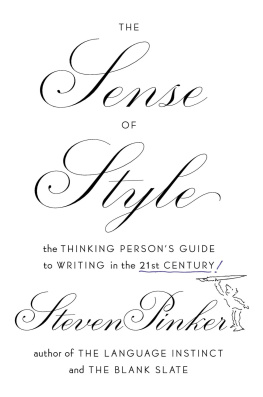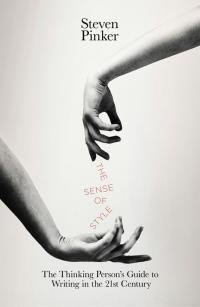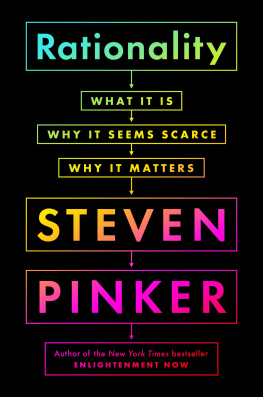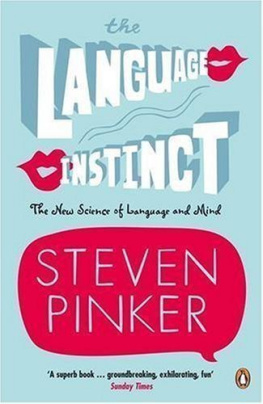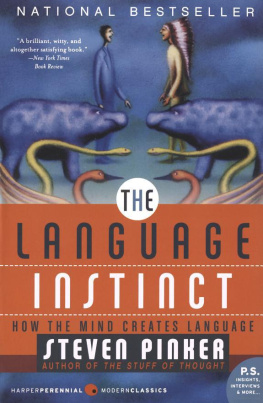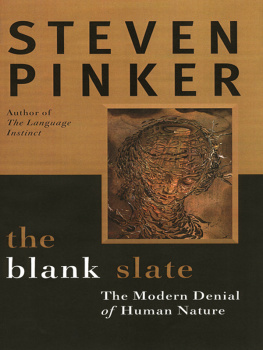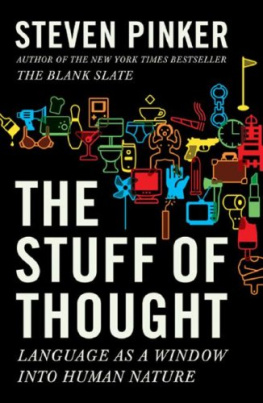Pinker - How the Mind Works
Here you can read online Pinker - How the Mind Works full text of the book (entire story) in english for free. Download pdf and epub, get meaning, cover and reviews about this ebook. City: London, year: 2003, publisher: Penguin Books Ltd, genre: Religion. Description of the work, (preface) as well as reviews are available. Best literature library LitArk.com created for fans of good reading and offers a wide selection of genres:
Romance novel
Science fiction
Adventure
Detective
Science
History
Home and family
Prose
Art
Politics
Computer
Non-fiction
Religion
Business
Children
Humor
Choose a favorite category and find really read worthwhile books. Enjoy immersion in the world of imagination, feel the emotions of the characters or learn something new for yourself, make an fascinating discovery.
How the Mind Works: summary, description and annotation
We offer to read an annotation, description, summary or preface (depends on what the author of the book "How the Mind Works" wrote himself). If you haven't found the necessary information about the book — write in the comments, we will try to find it.
How the Mind Works — read online for free the complete book (whole text) full work
Below is the text of the book, divided by pages. System saving the place of the last page read, allows you to conveniently read the book "How the Mind Works" online for free, without having to search again every time where you left off. Put a bookmark, and you can go to the page where you finished reading at any time.
Font size:
Interval:
Bookmark:

PENGUIN BOOKS
HOW THE MIND WORKS
A model of scientific writing: erudite, witty and clear. An excellent book
Steve Jones, New York Review of Books
A witty, erudite, stimulating and provocative book that throws much
new light on the machinery of the mind. An important book
Kenan Malik, Independent on Sunday
He has a great deal to say, much of it ground-breaking, some of it
highly controversial a primer in remarkable science writing
Simon Garfield, Mail on Sunday
As lengthy as it is, it will produce a book in the readers head
that is even longer. For it alters completely the way one thinks
about thinking, and its unforseen consequences probably
cant be contained by a book Christopher Lehmann-Haupt,
The New York Times
A landmark in popular science A major public asset
Marek Kohn, Independent
The humour, breadth and clarity of thought make this work
essential reading for anyone curious about the human mind
Raymond Dolan, Observer

ABOUT THE AUTHOR
Steven Pinker, a native of Montreal, studied experimental psychology at McGill University and Harvard University. After serving on the faculties of Harvard and Stanford universities he moved to the Massachusetts Institute of Technology, where he is currently Peter de Florez Professor of Psychology. Pinker has studied many aspects of language and of visual cognition, with a focus on language acquisition in children. He is a fellow of several scientific societies, and has been awarded research prizes from the National Academy of Sciences and the American Psychological Association, graduate and undergraduate teaching prizes from MIT, and book prizes from the American Psychological Association, the Linguistics Society of America and the Los Angeles Times. He is the author of The Language Instinct, available in Penguin, and Words and Rules: The Ingredients of Language.
FOR ILAVENIL
Any book called How the Mind Works had better begin on a note of humility, and I will begin with two.
First, we dont understand how the mind worksnot nearly as well as we understand how the body works, and certainly not well enough to design Utopia or to cure unhappiness. Then why the audacious title? The linguist Noam Chomsky once suggested that our ignorance can be divided into problems and mysteries. When we face a problem, we may not know its solution, but we have insight, increasing knowledge, and an inkling of what we are looking for. When we face a mystery, however, we can only stare in wonder and bewilderment, not knowing what an explanation would even look like. I wrote this book because dozens of mysteries of the mind, from mental images to romantic love, have recently been upgraded to problems (though there are still some mysteries, too!). Every idea in the book may turn out to be wrong, but that would be progress, because our old ideas were too vapid to be wrong.
Second, I have not discovered what we do know about how the mind works. Few of the ideas in the pages to follow are mine. I have selected, from many disciplines, theories that strike me as offering a special insight into our thoughts and feelings, that fit the facts and predict new ones, and that are consistent in their content and in their style of explanation. My goal was to weave the ideas into a cohesive picture using two even bigger ideas that are not mine: the computational theory of mind and the theory of the natural selection of replicators.
The opening chapter presents the big picture: that the mind is a system of organs of computation designed by natural selection to solve the problems faced by our evolutionary ancestors in their foraging way of life. Each of the two big ideascomputation and evolutionthen gets a chapter. I dissect the major faculties of the mind in chapters on perception, reasoning, emotion, and social relations (family, lovers, rivals, friends, acquaintances, allies, enemies). A final chapter discusses our higher callings: art, music, literature, humor, religion, and philosophy. There is no chapter on language; my previous book The Language Instinct covers the topic in a complementary way.
This book is intended for anyone who is curious about how the mind works. I didnt write it only for professors and students, but I also didnt write it only to popularize science. I am hoping that scholars and general readers both might profit from a birds-eye view of the mind and how it enters into human affairs. At this high altitude there is little difference between a specialist and a thoughtful layperson because nowadays we specialists cannot be more than laypeople in most of our own disciplines, let alone neighboring ones. I have not given comprehensive literature reviews or an airing of all sides to every debate, because they would have made the book unreadable, indeed, unliftable. My conclusions come from assessments of the convergence of evidence from different fields and methods, and I have provided detailed citations so readers can follow them up.
I have intellectual debts to many teachers, students, and colleagues, but most of all to John Tooby and Leda Cosmides. They forged the synthesis between evolution and psychology that made this book possible, and thought up many of the theories I present (and many of the better jokes). By inviting me to spend a year as a Fellow of the Center for Evolutionary Psychology at the University of California, Santa Barbara, they provided an ideal environment for thinking and writing and immeasurable friendship and advice.
I am deeply grateful to Michael Gazzaniga, Marc Hauser, David Kemmerer, Gary Marcus, John Tooby, and Margo Wilson for their reading of the entire manuscript and their invaluable criticism and encouragement. Other colleagues generously commented on chapters in their areas of expertise: Edward Adelson, Barton Anderson, Simon Baron-Cohen, Ned Block, Paul Bloom, David Brainard, David Buss, John Constable, Leda Cosmides, Helena Cronin, Dan Dennett, David Epstein, Alan Fridlund, Gerd Gigerenzer, Judith Harris, Richard Held, Ray Jackendoff, Alex Kacelnik, Stephen Kosslyn, Jack Loomis, Charles Oman, Bernard Sherman, Paul Smolensky, Elizabeth Spelke, Frank Sulloway, Donald Symons, and Michael Tarr. Many others answered queries and offered profitable suggestions, including Robert Boyd, Donald Brown, Napoleon Chagnon, Martin Daly, Richard Dawkins, Robert Hadley, James Hillenbrand, Don Hoffman, Kelly Olguin Jaakola, Timothy Ketelaar, Robert Kurzban, Dan Montello, Alex Pentland, Roslyn Pinker, Robert Provine, Whitman Richards, Daniel Schacter, Devendra Singh, Pawan Sinha, Christopher Tyler, Jeremy Wolfe, and Robert Wright.
This book is a product of the stimulating environments at two institutions, the Massachusetts Institute of Technology and the University of California, Santa Barbara. Special thanks go to Emilio Bizzi of the Department of Brain and Cognitive Sciences at MIT for enabling me to take a sabbatical leave, and to Loy Lytle and Aaron Ettenberg of the Department of Psychology and to Patricia Clancy and Marianne Mithun of the Department of Linguistics at UCSB for inviting me to be a Visiting Scholar in their departments.
Patricia Claffey of MITs Teuber Library knows everything, or at least knows where to find it, which is just as good. I am grateful for her indefatigable efforts to track down the obscurest material with swiftness and good humor. My secretary, the well-named Eleanor Bonsaint, offered professional, cheerful help in countless matters. Thanks go also to Marianne Teuber and to Sabrina Detmar and Jennifer Riddell of MITs List Visual Arts Center for advice on the jacket art.
Font size:
Interval:
Bookmark:
Similar books «How the Mind Works»
Look at similar books to How the Mind Works. We have selected literature similar in name and meaning in the hope of providing readers with more options to find new, interesting, not yet read works.
Discussion, reviews of the book How the Mind Works and just readers' own opinions. Leave your comments, write what you think about the work, its meaning or the main characters. Specify what exactly you liked and what you didn't like, and why you think so.






